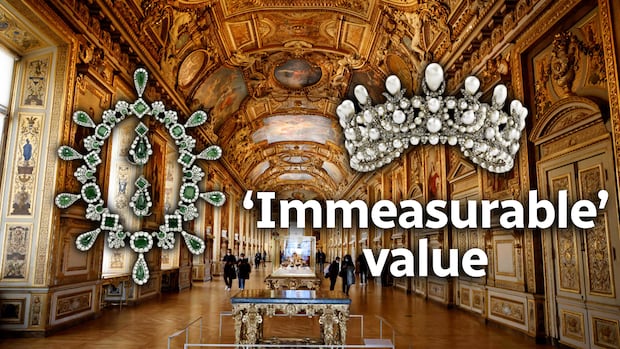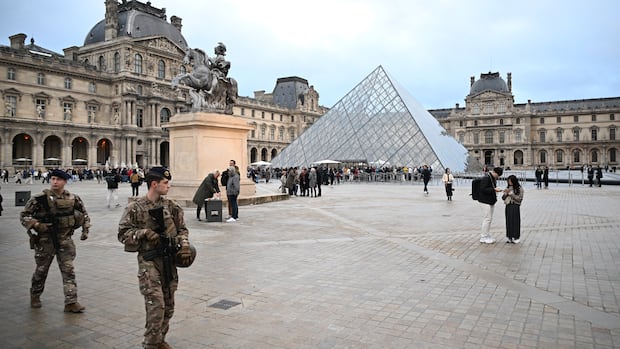LISTEN | Paris mayor on crown jewel heist at Louvre:
As It Happens6:23Paris mayor says the Louvre’s security system failed. Now he wants answers
Ariel Weil, Mayor of central Paris where the Louvre is located, says it’s obvious to him that the museum’s security system did in fact fail on Sunday.
But that’s contrary to what the French culture minister, Rachida Dati, has said.
After thieves broke into the museum early Sunday morning and made off with what remains of the priceless French crown jewels, nation-wide criticism over the museum’s security — or lack thereof — was swift.
In response, Dati waffled between blaming mismanagement by the museum leadership and underscoring the museum’s security effectiveness. On Tuesday she told lawmakers in the National Assembly, “The Louvre museum’s security apparatus did not fail; that is a fact … the Louvre museum’s security apparatus worked.”
But Weil questions how that could be so, given the swiftness of the theft — it took thieves a total of seven minutes to force open the window of the Apollo gallery and carry out the heist — and the value of the goods stolen, worth $143 million Cdn.
He spoke with As It Happens host Nil Koksal on Wednesday about his concerns and his desire for the city of Paris to be more involved in security plans for the Louvre in the future.
Here is part of that conversation.
Mayor, several days now after this stunning robbery, are you and other officials any closer to understanding how this security breach happened?
Well, we know a lot more about details and, in fact, we know what everybody knows today. I’m not privy to the investigation and whatever I know, I can’t share with the audience, but I think we still remain puzzled, and I think [so does] everyone in the world, that this could happen so quickly, so apparently easily, right? And that the value of what was taken in those seven minutes is so high.
We spoke with an expert the day after this robbery on these kinds of jewelry pieces, these kinds of historic artifacts. He said what he was shocked about was that this wooden window could easily be accessed, that there weren’t cameras on this area, and that they were able to do this so quickly. Were you surprised?
I was definitely surprised. You know, I’m not an expert of every single detail of the security of the Louvre Museum. We do work a lot with the Louvre Museum, but it is a state museum, so it’s not managed by the city. But I know a lot of people have looked into the security at the Louvre over the past few years, and now a lot stories are coming up, including the sort of supposed lack of investment in security measures. All I can say is I was there very early on Sunday when we heard about the break-in and was very surprised.
You don’t run the Louvre, obviously, but as someone who is in charge of the part of Paris where the Louvre is, do you feel any responsibility?
I think everyone’s responsible. I mean my major part has been trying to do something with the Louvre, which is, as I said, a national museum that doesn’t really respond to the city or to anyone else but the Ministry of Culture. I have worked with the Louvre museum. I’m pretty proud that I was part of convincing them and the president of France to engage in a major rework of the entrances, of the structure of the Louvre Museum, including the public space, which is where the city comes in, and that [has been] announced. I hear now that as part of that major plan, which is up to hundreds of millions [in] investments, that would include security investments. So I guess that I’m happy, but it just comes too late probably, but at least for the future. I think we’ve done what we could and I think that the relationship between the Louvre Museum, the state and the city has never been that close, and I’m happy that I could participate in that.
So you want to make those relationships closer. When you say that the museum doesn’t answer to the entire French public, it answers to the culture ministry. What do you mean specifically by that? How would you like to see that change?
The Louvre is in and of itself like a mini state in the centre of Paris. And all I’m saying is that it’s not a city museum. So we don’t have any official hierarchy relationship with the museum. So the city of Paris would not be privy to any security details as to what concerns the museum, for instance. But what I said was, a couple of months ago, the president of the French Republic, Manuel Macron, announced a major plan, which is estimated at hundreds of millions of euros of investment that would completely change the way that tourists can access the museum. By the way, also changed the way they see the Mona Lisa, which would be separated from other pieces in the museum and obviously increase its security. And we were part in that discussion; we’re actually sitting on the jury for that major operation.
The French culture minister, as you may have seen, said yesterday, “The museum’s security apparatus did not fail.” If it’s not [security] that failed, who or what is, in your view, to blame?
The Ministry of Interior, which covers the police operations — or was it the Ministry of Justice, perhaps? — said that when you have something that happens like that, something went wrong. And I think it is, we call this in French a “lapalissade,” when you state the obvious. I don’t see that you can say that everything went fine when you have such a quick steal that happens and the value of it is so high. I think it’ll be hard to say that everything went fine and there was no issue. Obviously we’re very interested in the conclusions of the investigations, but I think it’s hard to stay that nothing went wrong.
WATCH | How thieves pulled off a brazen crown jewel heist at the Louvre :
How thieves pulled off a brazen crown jewel heist at the Louvre | About That
The world’s most-visited museum — the Louvre — is now the site of what some are calling the heist of the decade. Andrew Chang breaks down how masked thieves made off with France’s crown jewels in a matter of minutes, and why the pieces may be impossible to recover.
Is there anything you can share in terms of whether they’re any closer to finding the culprits or retrieving any of these priceless items?
Well, I can only point you to the official communication on this…. But my initial reaction was, you know, wow, these are professionals, obviously, because to come in at 9.30 a.m. on a Sunday morning and just park your truck under the windows, go up, break in, come back with this treasure after seven minutes and go and leave without being challenged, you know, it seemed to me that this was professionals. And I just now realized that the prosecutor has said the same thing. She said that this was well prepared and she didn’t know at this stage if it involved more than four people that were directly involved.
There is, of course, the financial toll to this, the embarrassment, the headlines for the country and the museum itself. When we talk about these pieces, the history of these pieces and the reality that that they will likely be broken apart and sold. How does that feel for you personally?
I think every art historian I’ve read or heard or spoken to said it’s a disaster, these pieces are unique, there’s no way that they can be replicated and so it’s almost irrelevant how much the cost, the estimate of the cost is. I’ve heard 88 million euros, but obviously if you had that amount of money today, no one would be able to replicate these jewels and make them again, so the loss is a lot more than just its value, right? … But it’s not a financial loss, I think a lot more than that. It’s a piece of history that’s gone now.

